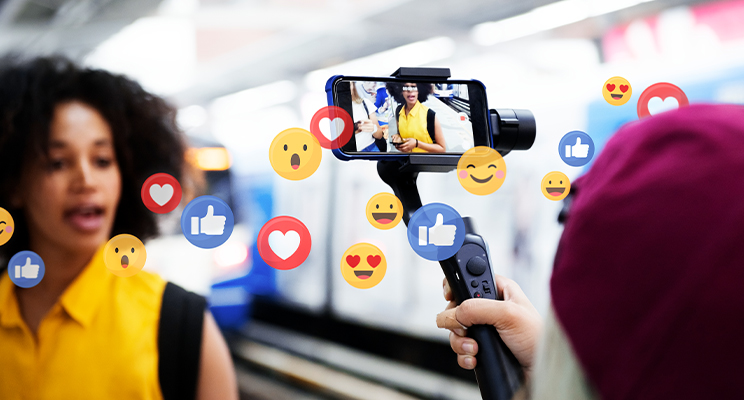Especially in this digital era, many entrepreneurs are content creators, AKA solopreneurs. They rely heavily on their personal brand to gain an audience.
However, all entrepreneurs benefit from a strong personal brand. That’s because people are more interested in the human behind the business than in the business itself. They buy from those they like, not just from who has the best thing.
I can hear the panic already. “I’ve already spent so much time developing my company brand, now I have to develop a personal brand as well?”
Yes. But don’t worry, it’s not as difficult as you might think. It comes down to forging a strong, authentic connection with your potential audience. And to achieve that, you need a personal brand.
Don’t try to hack it
Every entrepreneur gets the advice to choose their niche and pursue that with all their might. However, this may not be the best approach. Marketing and branding do not depend on a simple formula. You must have meaningful and relevant conversations with your ideal customers.
It’s common practice to declare a target persona or ideal client avatar for your business. However, treat those as guidelines rather than hard and fast rules for engaging your audience. No one likes to be put in a box, and so you must be open to people who don’t entirely meet your persona, as well as those who express interest even if they don’t meet your persona.
Ultimately, effective marketing is about connection. You must provide value to forge a loyal relationship. And that requires looking beyond your niche and honoring your unique offering as an entrepreneur.
Let’s face it: people appreciate entrepreneurs and want to hear their ideas. So, there’s no need to hack anything. The time-honored advice to “just be yourself” definitely applies here.
Know your value
In the age of Amazon and big-box stores, everyone angling for a discount. That can be discouraging to entrepreneurs, as we simply can’t provide our products or services so cheaply. But you offer something greater. You contain vast amounts of knowledge that you can share with your ideal customer client. People will gladly consume that, whether or not they have to pay for it.
Consider entrepreneurs such as Neil Patel and Ariana Huffington. Their distinctive, likable personalities attract people to their enterprises. There are countless SCO services and news blogs to choose from. But Patel’s and Huffington’s influence makes people want to hear from them.
That’s how your personal brand can help promote your business, no matter its size.
Imagine how you can make a meaningful connection with your target audience. What can you share from your personal life? What values can you express that your ideal customers might share? What specialized knowledge do you have that your audience would love to discover?
Humanizing social media

I’ll go ahead and assume that not all of your ideal customers or clients are in your geographic region. You must interact with people digitally, and social media is often the most powerful way to do this.
Unfortunately, social media does tend to be fairly artificial. You can’t always trust the content you see, nor the people slash bots who follow your account. This can make it difficult to find your brand community amidst all the noise.
Again, emphasizing your authenticity can help you find your people, no matter which platform they’re on. You must lead with a great story about your business, and listen to your customers’ stories as well. That is the key ingredient for a successful personal brand.
Remember, “brand” is simply another word for “reputation.” And we’d all like to be that person who inspires others with great stories yet is still a good friend and mentor to those in need.
As an entrepreneur, that is your role. Both your company and your personal brand must align to show people that what you have to say matters. More importantly, you are there to help them solve their problem.
In my 5 Ps, I talk about the promise you make to your customers. This promise guides all your other endeavors. But I may as well have called it P for “personal brand,” because that is the reputation you’re cultivating. Your impact on your audience is your promise, the expression of your brand personality.
Cultivating your personal brand
So, how can you develop and refine your personal brand as an entrepreneur?
First, identify your key differentiators. These are a bit like your unique selling proposition for your products. What sets you apart in your industry?
Second, decide how you relate to your target audience. For example, I’m the friendly guy who’s happy to share a beverage with you and hear all about your story. You can talk to me about your concerns and achievements, and I will eagerly listen.
Third, what problem can you uniquely solve? You likely already answered this question when developing your product or service. But I’d like you to think about what you, the human, can do beyond your business. People ultimately want to buy from people, not companies. Especially in this age when only makeup brands are available. People really respond to a humanized company.
Consider the actor Ryan Reynolds, who acquired Mint Mobile and Aviation Gin. He has used his gregarious personality and quirky home life to provide a touch of humanity to both companies. People appreciate that. Mint Mobile and Aviation Gin are no longer nameless, faceless brands that simply want your money. They are the enterprises of a relatable human with a witty personality and an adorable family.
Next, put yourself out there. Go into the digital and physical spaces where your target audience spends time period share your knowledge and wisdom. This is not only great organic marketing but also a chance to establish yourself as a thought leader.
Above all else, be authentic. Share your unique quirks, whether that’s your tendency to wear funky socks or your obsession with Starbucks drinks. Don’t try too hard to be likable or unique. Simply let your great ideas shine through, and have a conversation with the people who are interested in your expertise and enterprise.
Wrapping Up

A strong personal brand can mean the difference in how your overall company is perceived. While you may not need to insert your individual profile into all of your company marketing, expect the people will figure out who owns the company. The stronger your reputation, the stronger your company’s.
So, leverage your personal brand to attract new customers. Make it a matter of camaraderie and loyalty, rather than simply being another generic spokesperson.
As we say in marketing, it’s vital for people to know, like, and trust you. All that is most possible when we embrace our authentic selves and nurture our personal brand.
This article is inspired by an episode of the Simplifying Entrepreneurship Podcast in which I interview Mary Henderson, business coach and personal branding strategist.




0 Comments